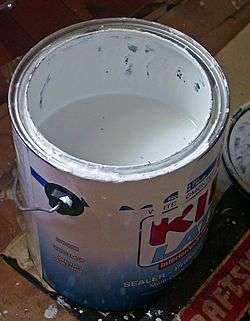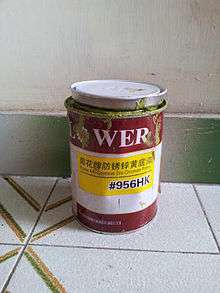Primer (paint)

A primer (/ˈpraɪmər/) or undercoat is a preparatory coating put on materials before painting. Priming ensures better adhesion of paint to the surface, increases paint durability, and provides additional protection for the material being painted.[1]
Composition
20%-30% synthetic resin, 60%-80% solvent and 2%-5% additive agent.
When are primers used
Primer is a paint product that allows finishing paint to adhere much better than if it were used alone. [2] For this purpose, primer is designed to adhere to surfaces and to form a binding layer that is better prepared to receive the paint. Because primers do not need to be engineered to have durable, finished surfaces, they can instead be engineered to have improved filling and binding properties with the material underneath. Sometimes, this is achieved with specific chemistry, as in the case of aluminium primer, but more often, this is achieved through controlling the primer's physical properties such as porosity, tackiness, and hygroscopy.
In practice, primer is often used when painting many kinds of porous materials, such as concrete and especially wood (see detailed description below). Priming is mandatory if the material is not water resistant and will be exposed to the elements. Priming gypsum board (drywall) is also standard practice with new construction because it seals the wall and aids in preventing mold. Primers can also be used for dirty surfaces that, for some reason, cannot be cleaned, or before painting light colors over existing dark colors.
Primers can usually be tinted to a close match with the color of the finishing paint. If the finishing paint is a deep color, tinting the primer can reduce the number of layers of finishing paint that are necessary for good uniformity across the painted surface.
There may be a maximum time frame within which a topcoat should be applied over the primer after the primer dries, in order to achieve maximum performance. Depending on the primer, the next coat of paint should be applied as quickly as 24 hours or you may have as long as 2 weeks. Painting after the suggested timeframe may cause performance issues depending on the specific situation. Supposedly, you want to apply the finish coat of paint before the primer fully cures on a molecular level. Doing this allows maximum adhesion/bonding of the topcoat to the primer. If topcoating after the suggested timeframe, consider using a "self priming" topcoat. For definitive answers on recommended repainting timeframe, check the primer label/website, or contact the manufacturer directly. Recoat timeframe is most likely a more critical factor in exterior application because of the more extreme climatic exposure.
Primers for wood
Using a primer on wood before painting is important for several reasons. First of all, wood is very porous and will absorb the solvent from paint, drying the paint prematurely. Because most paints undergo chemical reactions during the process of curing (for example, latex and alkyd-based paints actually polymerize when curing), they depend on water or solvent being evaporated slowly rather than being absorbed quickly by the underlying material. A layer of primer will help the paint to undergo its proper, complete curing cycle.
Secondly, without a primer, several layers of paint can be necessary to completely obscure the wood grain and ensure even color.
Lastly, if wood is exposed to moisture, a thin layer of paint will still be water permeable. The end result will be warped parts, mildew, and dry rot. Primer adds to the waterproofing effect of the paint.[3]
Quality primers are often comparable in price to finish paints, their cost influenced by the quality of binders that they use. Some specialty primers are in fact quite costly.
Primers are not necessary for a wood stain treatment that is designed to show the wood grain. On soft woods, a wood conditioner (thinned shellac or varnish) allows for more even coloring of stain. Sealers are designed to promote uniform finishes. They are designed with qualities that promote quick drying and they have high isocynate content and are not sandable,
Primers for metal

Some metals, such as untreated aluminium, require a primer; others may not. A primer designed for metal is still highly recommended if a part is to be exposed to moisture. Once water seeps through to the bare metal, oxidation will begin (plain steel will simply rust). Metal primers might contain additional materials to protect against corrosion, such as sacrificial zinc.
Metal hydroxides/oxides do not provide a solid surface for the paint to adhere to, and paint will come off in large flakes. Using a primer will provide extra insurance against such a scenario. An additional reason for using a primer on metal could be the poor condition of the surface. A steel part can be rusty, for example. Of course, the best solution is to thoroughly clean the metal (blasting), but when this is not a viable option, special kinds of primers can be used that chemically convert rust to the solid metal salts. And even though such surface is still lacking in comparison to the shiny clean metal, it is yet much better than weak, porous rust.
Painting and gluing aluminium is especially important in the aircraft industry, which uses toxic zinc chromate primers and chromating to add the necessary adhesion properties.
Primers for plastic
Using a primer on surfaces made of plastic is only necessary when making a drastic change of color (going from dark brown to white, for example), because most household plastics are not very porous and are not easily damaged by moisture; or when a long-lasting coat of paint is desired. A primer will reduce the number of layers of paint necessary to completely cover the previous color, and will help the paint make a thorough bond with the surface being painted. Because most paints and primers designed to be used for painting plastics are not water based, an important point for choosing a primer for plastic is making sure the primer's propellant or solvent will not dissolve or warp the plastic part itself (e.g. most common household spray paint will damage polystyrene foam). Both the primer and paint should be tested on a small hidden spot of the part being painted.
See also
References
- ↑ "Primer Paint". Painting-ideas-and-techniques.com. 2013-04-18. Retrieved 2013-12-01.
- ↑ "primer for road".
- ↑ Do I Need to Use Paint Primer?, archived from the original on 2008-03-11, retrieved 2010-02-10.
|